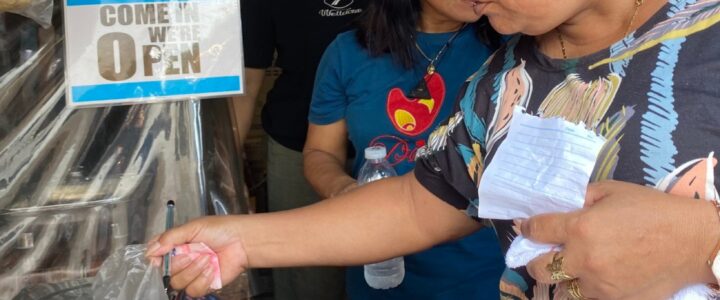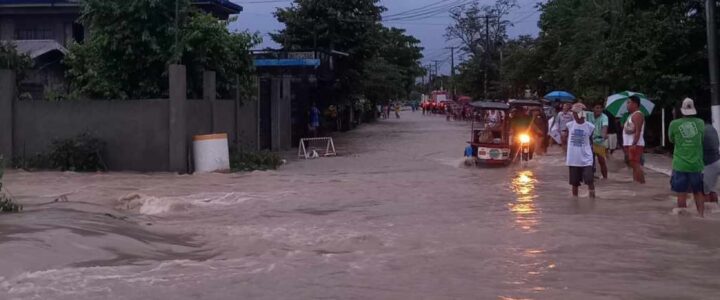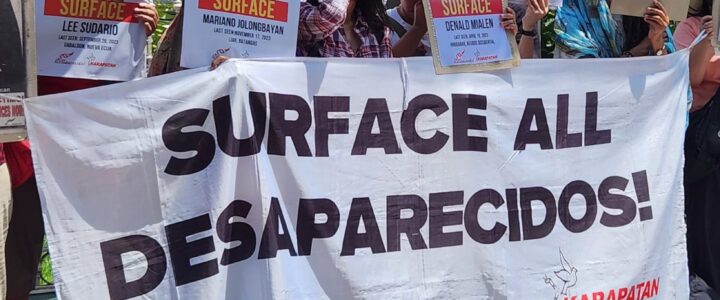Badyet para sa serbisyong panlipunan, hindi korapsyon at katiwalian!



The Center for Women’s Resources condemns the government’s attempt to artificially lower unemployment numbers by considering Filipinos work one per ‘reference period’ as employed – an insult to 20 million economically insecure women.
CWR reiterates the importance of using grounded and accurate data when formulating policies related to employment and poverty. The recent statement from the Department of Labor and Employment (DOLE) during the Senate committee hearing and budget deliberations suggesting that a Filipino working just one hour a day qualifies as employed is a concerning simplification that obscures the real extent of the employment crisis in the Philippines.
In a recent survey conducted by CWR in June 2024, it was noted that the job crisis remains one of the top concerns of women. This indicates that unemployment, loss of livelihood, and its resulting poverty and hunger is a serious problem — a violation of women’s rights. Amidst an escalating economic crisis and widespread human suffering, it is of utmost importance to surface concrete, ground-level data that accurately depicts the conditions people face.
Despite the obvious attempt to give false sense of economic development, no amount of convenient redefinitions can mask the lived experiences of Filipinos. Blurring the lines between employment and unemployment through such convenient definitions does not address these issues. Similar to NEDA’s statement claiming PhP64.00 pesos to suffice for daily food cost, it fails to reflect the severity of economic hardship experienced by many, particularly women. It refrains the implementation of meaningful solutions that will ensure long-term, sustainable growth and people-centered development.
CWR reiterates that grounded data and evidence should serve as a basis for crafting economic policies that serve the most marginalized. Doing otherwise would only serve the interests of a few rich in the country. CWR urges all Filipinos to resist accepting such misinformation and to continue voicing their real conditions and demands. ###

The Center for Women’s Resources (CWR) stands with disaster victims, women’s organizations, climate activists, and rights groups in holding the state accountable for its role in the destruction and displacement of communities, livelihood, and environment. The government’s support for large-scale mining companies, prioritization of corporate interests, and neglect of its responsibilities to the Filipino people have left many in a dire state.
While still reeling from the impacts of Typhoon Carina (Gaemi), only a few weeks ago, the Philippines has been hit with another disaster. Typhoon Enteng (Yagi) caused massive floods and landslides in many areas of the country. This relentless cycle of climate disasters hit women and children the most. With limited or no access to basic social services and resources, they are particularly vulnerable to displacement, joblessness, and health and safety risks.
Recent tragedies highlight this vulnerability. In Rizal, a mother, who was about to go to work in the middle of a storm, lost her home and two sons in a landslide. Another landslide in the same province claimed the life of a pregnant woman who was expected to give birth this month. In Bicol, a 9-month old infant drowned.
The massive infrastructure projects the Marcos Jr. administration shamelessly funds and supports make these communities increasingly prone to climate disasters. Despite this reality, a huge sum of funds in the proposed 2025 national budget have been allocated to further fuel destructive projects instead of assistance and services to mitigate and respond to these disasters. Large-scale mining and quarrying projects run rampant which ultimately destroy communities making them even more vulnerable to devastation.
CWR enjoins all Filipinos to continue to demand swift government action and assistance, and at the same time, hold duty bearers accountable for their neglect of these responsibilities. We urge everyone to scrutinize the 2025 national budget and demand allocations that benefit the most vulnerable. Together, let us ensure that every peso of the people’s money will be allocated to services that benefit the most marginalized, rather than serving narrow interests of a few. #
* CWR alongside other grassroots and civil society organizations is initiating relief efforts to provide immediate aid to families affected. We appeal to compassionate individuals and organizations to join us in supporting those in need. For those who would like to contribute, you may contact us at cwrgrl@gmail.com or 0953 478 0468.

On the occasion of the International Day of the Disappeared, the Center for Women’s Resources (CWR) joins the families and friends of the disappeared, advocates and human rights defenders, in renewing the calls to end involuntary disappearance and human rights violations in the Philippines.
Families of Victims of Involuntary Disappearance (FIND) documented 2,586 reported victims of enforced disappearances in the country since the dictatorship of Marcos Sr. To this day, 1,183 have yet to be found.
Ferdinand Marcos Sr.’s legacy of human rights violations lives on through his son with 38 reported cases of enforced disappearances only two years into his presidency. This includes Elgene Mungcal, Lyn Grace Martullinas, and Deah Lopez – women human rights defenders who dedicated their lives in pursuit of social justice.
The most recent case involves environmental defender Rowena Dasig, who has been missing since August 22, 2024. She was arrested and detained on July 12, 2023, by the 85th Infantry Battalion of the Philippine Army in Quezon while doing community research. On August 13, charges against her were dismissed due to lack of evidence. She was reportedly released from the Lucena City District Jail on August 22, but no one has seen or heard from her since.
Despite the enactment of the Anti-Enforced or Involuntary Disappearance Act – the first of its kind in Asia, activists and human rights defenders are at risk of abduction and disappearance. The Marcos Jr. administration, which presents itself as a champion of human rights in international spaces, is culpable for the continuing attacks against human rights defenders and widespread impunity. The number of desaparecidos continues to rise and justice is yet to be served.
These desaparecidos, who are usually political activists, human rights defenders, and leaders of labor unions and peasant organizations, are from the poorest sectors of society who have been systematically marginalized and are left with no choice but to protect themselves and their rights in the different forms available to them.
We demand that the national government address the crisis—the very issue that compels women and the people to rise up to defend their lives and rights—rather than undermining the freedoms and security of individuals and organizations. Such actions only cause distress to families and communities and ultimately erode public trust in the institutions meant to protect and serve.
The Center for Women’s Resources condemns all forms of enforced disappearances and human rights violations. We join organizations and individuals in supporting victims and their families in their quest for justice, to ensure that such violations are never tolerated, and in holding the current and past administrations accountable for their crimes against the people.Uphold and respect the rights and dignity of human rights defenders! Surface all victims of enforced disappearances!

Bumungad sa mga residente ng NCR at mga rehiyon ng CALABARZON, Central Luzon, Cordillera, MIMAROPA, Bicol, Central at Western Visayas, hanggang Northern Mindanao ang walang-tigil na pag-ulan noong Hulyo 24, 2024 dulot ng habagat na pinalakas ng Super Typhoon Carina.
Umaga pa lamang ay nagsimula na ang rescue operations sa mga bahaing komunidad sa Metro Manila at iba pang lugar dahil sa mabilis na pagtaas ng tubig. Sa datos ng PNP, umabot na sa 34 ang naitalang nasawi, mayorya ay dahil sa pagkalunod, landslide, at iba pang pinsala dulot ng pagbaha.
Ayon sa NDRRMC, umabot sa 1.3 milyon indibidwal o 299,344 pamilya ang apektado sa buong bansa (maliban sa Eastern Visayas), habang tinatayang ₱9.7 milyon ang halaga ng pinsala sa agrikultura, ₱6.6 milyon sa mga irigasyon, at ₱1.3 milyon sa imprastraktura. Matinding hagupit ito sa mahihirap na mamamayan, lalo na sa mga kababaihan at bata.
Sa katatapos na State of the Nation Address (SONA), ipinagmalaki ni Pang. Marcos Jr. ang 5,500 flood control projects na natapos sa ilalim ng kanyang administrasyon.
Umabot sa ₱12.13 bilyon ang inutang ng gobyerno sa World Bank noong 2017 upang isagawa ang Metro Manila Flood Management Project na layuning resolbahin ang pagbaha sa Metro Manila sa pamamagitan ng pag-modernisa sa drainage system at pagsasaayos ng waste collection at disposal system, ito raw ay pakikinabangan ng 3.5 milyong residente sa mga bahaing lugar sa Metro Manila.
Ang ₱255 bilyong badyet na inilaan para rito sa ilalim ng DPWH ay mas malaki pa sa badyet ng Department of Agriculture (₱167B), Department of Science and Technology (₱27B), Commission on Higher Education (₱31B), at State Universities and Colleges (₱106B).
Ngunit dalawang araw matapos ang SONA, nabunyag ang kapalpakan ng mga nasabing proyekto nang kinumpirma ng MMDA na hindi kinakaya ng kasalukuyang drainage system ang matinding pag-ulan dahil 30 mm/hr lang ang kayang i-proseso kumpara sa 74 mm/hr na buhos ng ulan.
Imbis na akuin ang pananagutan, ginamit ni Marcos Jr. ang usapin ng climate change at sinisi ang mga mamamayan na nagtatapon ng basura sa kanilang paligid bilang dahilan ng matinding pagbaha.
Patunay ito na walang malasakit at pagpapahalaga ang gobyernong Marcos Jr. sa mahihirap na pamilya na nalubog sa baha, walang makain, at nasiraan ng maraming kagamitan. Malinaw ang kanyang kapabayaan at pagtalikod sa responsibilidad sa panahon ng kalamidad.Kasalukuyang nakapailalim sa state of calamity ang buong Metro Manila, dapat kagyat na mabigay ang suporta at serbisyo sa mga biktima ng kalamidad.
Kailangang matiyak na ilalaan ang calamity funds sa emergency response katulad ng pagkain, tubig, medisina, maayos na sanitasyon, paglilinis sa komunidad, kasama ang dagliang paghahakot ng mga basura na nakatambak sa mga kalsada, at iba pa.Kailangan ang maagap na pagbibigay ng serbisyong pangkalusugan upang maiwasan ang pagkalat ng sakit lalo na ng diarrhea, leptospirosis, at mga sakit sa balat dulot ng pagkababad sa tubig-baha. Dapat ding matiyak na estable at walang manipulasyon ng presyo ng mga bilihin sa kalakhang Maynila.
Sa nalalapit na budget deliberations, mahalagang makialam ang mamamayan at ipanawagan na pagtuunan ng pansin ang mga programa at flood management interventions na angkop sa sitwasyon ng mga komunidad.
Marapat na matapat na iulat sa mamamayan kung saan at paano ginagamit ang bilyon-bilyong pondo mula sa kaban ng bayan. Kasabay nito, kailangang itigil ang mga mapaminsalang aktibidad ng quarrying, large-scale mining, at reclamation projects ng mga malalaking lokal at dayuhang korporasyon na patuloy na sumisira sa kalikasan at siyang sanhi ng malalang pagbaha.
Kailangang panagutin kapwa ang administrasyong Marcos Jr. at ang nakaraang administrasyong Duterte sa sistematikong kapabayaan at lantarang kawalan malasakit sa mamamayan!Mahigpit na magkaisa at tumindig para ipaglaban ang mga karapatan sa panahon ng krisis at kalamidad!